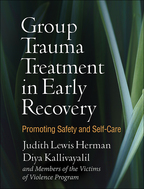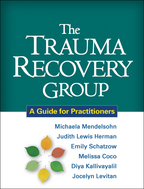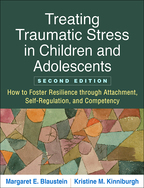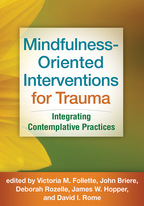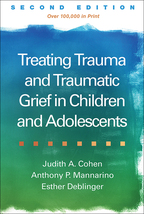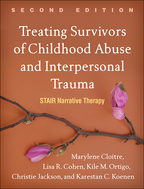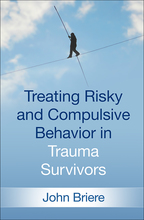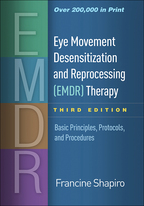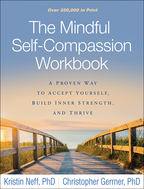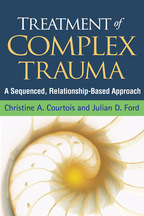Group Trauma Treatment in Early Recovery
Promoting Safety and Self-Care
Judith Lewis Herman, Diya Kallivayalil, and Members of the Victims of Violence Program
A Paperback Originale-bookprint + e-book
A Paperback Original
orderNovember 19, 2018
ISBN 9781462537440
Price: $43.00 150 Pages
Size: 8" x 10½"
Learn more about the authors.
Sign up for emails on upcoming titles on Trauma & PTSD (with special discounts)!
Sign up for emails on upcoming titles on Trauma & PTSD (with special discounts)!
“This book reflects decades of learning by the award-winning therapists at the Victims of Violence Program. With a focus on skills and processes to mitigate the impact of trauma and violence, the volume is an important addition to the libraries of clinicians treating those subjected to interpersonal violence of all types. I strongly recommend this book for beginning, intermediate, and even the most experienced therapists.”

—Terence M. Keane, PhD, National Center for PTSD, VA Boston Healthcare System, and Department of Psychiatry, Boston University School of Medicine
“Drawing on decades of collective experience, Herman, Kallivayalil, and their coauthors provide detailed therapeutic approaches to the expectable—and ultimately manageable—victim responses to trauma. Every therapist interested in conducting trauma psychoeducation as an integral part of the early phase of treatment will benefit from the time-tested, practical, and broadly adaptable strategies richly illustrated in this manual.”

—Frank W. Putnam, MD, Professor of Psychiatry, University of North Carolina at Chapel Hill
“Herman, with the collaboration of her colleagues, has done it again—this book is a gem. It provides accessible, step-by-step guidance for facilitating a Stage 1 trauma group, addressing both content and process. The authors provide thorough instructions for each of the 10 sessions, including scripts for introducing the session's content as well as downloadable handouts and worksheets. While this is clearly a finely honed intervention, the authors also demonstrate how it can be modified for different trauma populations. This book contains everything a novice clinician needs to know about working with trauma survivors and is sophisticated enough to benefit the advanced practitioner. It is an excellent resource for trainees and clinicians new to the field of trauma.”

—Catherine C. Classen, PhD, Department of Psychiatry, University of California, San Francisco
“Essential reading for all therapists and students in the mental health and social services fields. This book brings together the insights of Trauma and Recovery icon Judith Lewis Herman and her colleagues at the Victims of Violence Program to provide a crucial roadmap for the too-often overlooked initial phase of trauma therapy. Therapeutic engagement and education are brought to light with rich case examples. Concise, practical worksheets help survivors to unpack the meaning of their traumatic experiences and find meaning and hope in their lives.”

—Julian D. Ford, PhD, ABPP, Department of Psychiatry, University of Connecticut Health Center
“This is one of a very few trauma-focused treatment guides that have the explicit goal of utilizing group process as a central component of therapy. The approach addresses key, common concerns of trauma survivors in early recovery—it combines psychoeducation with work on safety, affect regulation, shame, and self-compassion. The authors provide a theoretical rationale for the approach, a clear structure for delivery of session content, and sample dialogues that offer exemplars of how to elicit participation and actively support participants’ learning and reflection. As an instructor of group treatment courses, I am excited to share with my students this insightful, articulate example of an early-stage treatment for trauma survivors that attends to and utilizes group process.”

—Shannon M. Lynch, PhD, Department of Psychology, Idaho State University
—Terence M. Keane, PhD, National Center for PTSD, VA Boston Healthcare System, and Department of Psychiatry, Boston University School of Medicine
“Drawing on decades of collective experience, Herman, Kallivayalil, and their coauthors provide detailed therapeutic approaches to the expectable—and ultimately manageable—victim responses to trauma. Every therapist interested in conducting trauma psychoeducation as an integral part of the early phase of treatment will benefit from the time-tested, practical, and broadly adaptable strategies richly illustrated in this manual.”
—Frank W. Putnam, MD, Professor of Psychiatry, University of North Carolina at Chapel Hill
“Herman, with the collaboration of her colleagues, has done it again—this book is a gem. It provides accessible, step-by-step guidance for facilitating a Stage 1 trauma group, addressing both content and process. The authors provide thorough instructions for each of the 10 sessions, including scripts for introducing the session's content as well as downloadable handouts and worksheets. While this is clearly a finely honed intervention, the authors also demonstrate how it can be modified for different trauma populations. This book contains everything a novice clinician needs to know about working with trauma survivors and is sophisticated enough to benefit the advanced practitioner. It is an excellent resource for trainees and clinicians new to the field of trauma.”
—Catherine C. Classen, PhD, Department of Psychiatry, University of California, San Francisco
“Essential reading for all therapists and students in the mental health and social services fields. This book brings together the insights of Trauma and Recovery icon Judith Lewis Herman and her colleagues at the Victims of Violence Program to provide a crucial roadmap for the too-often overlooked initial phase of trauma therapy. Therapeutic engagement and education are brought to light with rich case examples. Concise, practical worksheets help survivors to unpack the meaning of their traumatic experiences and find meaning and hope in their lives.”
—Julian D. Ford, PhD, ABPP, Department of Psychiatry, University of Connecticut Health Center
“This is one of a very few trauma-focused treatment guides that have the explicit goal of utilizing group process as a central component of therapy. The approach addresses key, common concerns of trauma survivors in early recovery—it combines psychoeducation with work on safety, affect regulation, shame, and self-compassion. The authors provide a theoretical rationale for the approach, a clear structure for delivery of session content, and sample dialogues that offer exemplars of how to elicit participation and actively support participants’ learning and reflection. As an instructor of group treatment courses, I am excited to share with my students this insightful, articulate example of an early-stage treatment for trauma survivors that attends to and utilizes group process.”
—Shannon M. Lynch, PhD, Department of Psychology, Idaho State University

